 In a bold, nay brave, nay reckless move, the LA Times offered readers the chance to edit its editorials on their website via a “Wikitorial”.
In a bold, nay brave, nay reckless move, the LA Times offered readers the chance to edit its editorials on their website via a “Wikitorial”.
Floating in a fluffy cloud of philanthropy, editors at the LA Times invited readers to comment on an editorial urging a better-defined plan to withdraw troops from Iraq, suggesting the sacking of Defense Secretary Rumsfeld if those goals were not met.
The paper hoped to display the original editorial and interim versions along with the readers’ final product on their website.
“The result is a constantly evolving collaboration among readers in a communal search for truth,” glowed the paper in its Friday edition. “Or that’s the theory.”
“Wikis” – derived from the Hawaiian word for “quick – take the form of online communities where users collectively write and edit articles, with the ability to correct, override or even delete other contributors’ work.
Nearly 1,000 users eagerly registered to rewrite Friday’s lead editorial, with many offering opposing viewpoints and hyperlinks to other sites. By early Sunday morning the wiki was gone.
Within hours, one enthusiastic reader had managed to change the headline on several pages to read “F*** USA,” and in their hasty scramble to remove the offensive headline, site editors managed to simultaneously lose several readers’ comments.
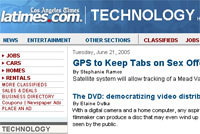 At midnight, the site managers left the doors to the candy store wide open and headed home for the night, presenting an irresistible temptation to online wagsters to do their worst, free from moderation.
At midnight, the site managers left the doors to the candy store wide open and headed home for the night, presenting an irresistible temptation to online wagsters to do their worst, free from moderation.
In the wee small hours, nefarious posters flooded the wiki with “inappropriate” posts, pornographic images and several instances of a well known picture of a man’s naughty bits.
As the porn – and complaints – rolled in, Michael Newman, deputy editor of the editorial page, found himself hauled out of bed at 4am to shut the feature down completely.
Bloodied but undaunted, managers of the newspaper’s editorial and Internet operations said they still might attempt to have another bash at online editorials written collectively by readers.
“As long as we can hit a high standard and have no risk of vandalism, then it is worth having a try at it again,” said Rob Barrett, general manager of Los Angeles Times Interactive.
Steve Outing, senior editor with the journalism think tank Poynter Institute, applauded the LA Times for its “bold experiment” adding, “That being said, I’m not at all surprised (by the problems). Wikis are pretty new, and we don’t entirely understand them and know how they are going to work out yet”.
 Apple is elbowing its corporate presence onto Glastonbury Festival with a launch at world famous music event later this week, according to a report in MacWorld.
Apple is elbowing its corporate presence onto Glastonbury Festival with a launch at world famous music event later this week, according to a report in MacWorld.  This will feature winners of a competition run between iTunes and Hit40UK which asked budding musos to create a five-song iMix of tracks they felt appropriate for kick-starting the Dance stage this year.
This will feature winners of a competition run between iTunes and Hit40UK which asked budding musos to create a five-song iMix of tracks they felt appropriate for kick-starting the Dance stage this year.  These take the form of fan-tempting collectible iTunes cards stuffed full of band-specific artwork and special codes that let mustard-keen fans download tracks from a specific artist or album.
These take the form of fan-tempting collectible iTunes cards stuffed full of band-specific artwork and special codes that let mustard-keen fans download tracks from a specific artist or album.  eGov Monitor is reporting that pressure is building for a national campaign to spur demand for eGovernment, with the government likely to be asked to fund a large-scale marketing campaign to promote online public services.
eGov Monitor is reporting that pressure is building for a national campaign to spur demand for eGovernment, with the government likely to be asked to fund a large-scale marketing campaign to promote online public services. 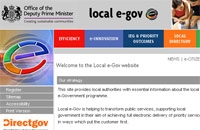 Although growth in the take-up of some e-services has been promising, the eGov article states that the need to drive up public usage across the board remains a major concern for the UK’s eGovernment programme.
Although growth in the take-up of some e-services has been promising, the eGov article states that the need to drive up public usage across the board remains a major concern for the UK’s eGovernment programme.  It’s not yet confirmed, but it appears that Google is preparing to challenge PayPal with its own online electronic payment system, rumoured to be called ‘Google Wallet’.
It’s not yet confirmed, but it appears that Google is preparing to challenge PayPal with its own online electronic payment system, rumoured to be called ‘Google Wallet’.  Sellers who run auctions on eBay are major buyers of Google’s ads, which appear alongside search results, so it’s not surprising to see the company angling in for a slice of the payment action.
Sellers who run auctions on eBay are major buyers of Google’s ads, which appear alongside search results, so it’s not surprising to see the company angling in for a slice of the payment action.  According to a survey by Entertainment Media Research, UK legal digital music downloads have grown by a thumping great 75% in a year.
According to a survey by Entertainment Media Research, UK legal digital music downloads have grown by a thumping great 75% in a year. 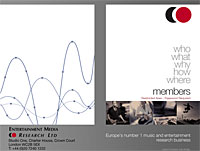 These findings are supported by the news that legal digital downloads have accounted for 8% of Coldplay’s recent album sales in the US – the biggest share for any new release to date.
These findings are supported by the news that legal digital downloads have accounted for 8% of Coldplay’s recent album sales in the US – the biggest share for any new release to date.  Two fifths of those surveyed preferred digital downloads because they were only interested in one or two tracks, while 29% downloaded music to sample an album before purchase.
Two fifths of those surveyed preferred digital downloads because they were only interested in one or two tracks, while 29% downloaded music to sample an album before purchase.  Sony BMG Music Entertainment has announced that it intends to add copy-restricting software to its latest CDs.
Sony BMG Music Entertainment has announced that it intends to add copy-restricting software to its latest CDs.  This doesn’t affect Apple computer users – they can freely copy and transfer music from the restricted CDs to their iPods – but consumers using Microsoft’s Windows software won’t hear a note, although they will be able to transfer music to Windows Media-supporting devices.
This doesn’t affect Apple computer users – they can freely copy and transfer music from the restricted CDs to their iPods – but consumers using Microsoft’s Windows software won’t hear a note, although they will be able to transfer music to Windows Media-supporting devices. 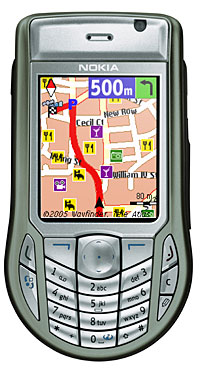 Nokia and Wayfinder Systems have proudly proclaimed the availability of the Nokia 6630 Navigation Pack, a compact smartphone-based navigation package for folks on the move.
Nokia and Wayfinder Systems have proudly proclaimed the availability of the Nokia 6630 Navigation Pack, a compact smartphone-based navigation package for folks on the move. 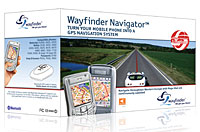 Never one to knowingly undersell his product, Jonas Sellergren, VP Product Management, Wayfinder Systems proclaimed “the Wayfinder Navigator application on the Nokia 6630 brings the ultimate navigation solution to the consumer.”
Never one to knowingly undersell his product, Jonas Sellergren, VP Product Management, Wayfinder Systems proclaimed “the Wayfinder Navigator application on the Nokia 6630 brings the ultimate navigation solution to the consumer.” 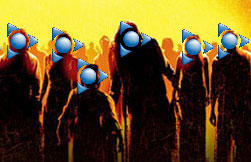 A recent study by security vendor Prolexic Technologies has declared AOL to be king of the zombies, with their customer’s machines accounting for more infections than any other ISP.
A recent study by security vendor Prolexic Technologies has declared AOL to be king of the zombies, with their customer’s machines accounting for more infections than any other ISP.  In full-on PR schmooze mode, AOL spokesman Andrew Weinstein declared the numbers to be “great news” for the company, pointing out that the number of Zombies on its network is actually low in relation to the total number of its members.
In full-on PR schmooze mode, AOL spokesman Andrew Weinstein declared the numbers to be “great news” for the company, pointing out that the number of Zombies on its network is actually low in relation to the total number of its members.  In a novel move to publicise the benefits of broadband for regional dwellers, the Welsh Assembly Government’s Broadband Wales Unit sent mobile Internet gateways scurrying around the valleys and mountains of lovely, lovely Wales.
In a novel move to publicise the benefits of broadband for regional dwellers, the Welsh Assembly Government’s Broadband Wales Unit sent mobile Internet gateways scurrying around the valleys and mountains of lovely, lovely Wales.  The Get Smart – Get Broadband campaign revs up at Swansea Party in the Park this Sunday, where fans will be able to send messages (known in the vernacular as “shout outs”) from the Smart Cars to a giant onstage screen.
The Get Smart – Get Broadband campaign revs up at Swansea Party in the Park this Sunday, where fans will be able to send messages (known in the vernacular as “shout outs”) from the Smart Cars to a giant onstage screen.  A report by compilers Mintel International has revealed that pets are being ousted by consumer electronics in British homes.
A report by compilers Mintel International has revealed that pets are being ousted by consumer electronics in British homes.  The study observed that, “In those families with children, the demand for pets may not be as strong as it once was, since many children now prefer to immerse themselves in the world of computer games and TV programmes”.
The study observed that, “In those families with children, the demand for pets may not be as strong as it once was, since many children now prefer to immerse themselves in the world of computer games and TV programmes”.  But it’s not all bad news for our precious pampered pooches and treasured tabbies, with the report revealing that sales of pet food, accessories and pet insurance have rocketed by 24 percent in the past five years, reaching a total of US$6.5 billion.
But it’s not all bad news for our precious pampered pooches and treasured tabbies, with the report revealing that sales of pet food, accessories and pet insurance have rocketed by 24 percent in the past five years, reaching a total of US$6.5 billion.  With the rise of home entertainment robots like the Sony Aibo and the forthcoming Nintendo virtual pet game, Nintendogs (where virtual dogs will respond to voice commands and bark at passing Nintendog consoles), we wonder how long it will be before children think that pets live on batteries.
With the rise of home entertainment robots like the Sony Aibo and the forthcoming Nintendo virtual pet game, Nintendogs (where virtual dogs will respond to voice commands and bark at passing Nintendog consoles), we wonder how long it will be before children think that pets live on batteries.